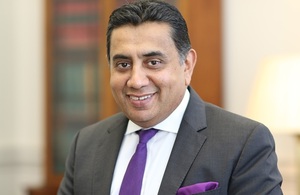Minister for Human Rights chairs coronavirus roundtable with faith leaders
Leaders from the UK’s major faith groups and faith-based aid charities met virtually today to discuss the global impact of coronavirus on religious communities.

Lord Ahmad
Leaders from the UK’s major faith and belief groups and faith-based aid charities met virtually today (8 June) to discuss the global impact of coronavirus on communities, and how they can work effectively together in the fight against the virus.
Chaired by UK’s Minister of State for Human Rights Lord (Tariq) Ahmad of Wimbledon, faith and belief leaders also talked about the importance of religious support services in tackling the pandemic, including those based in mosques, churches, temples, synagogues and other religious or non-religious organisations. It comes as the World Health Organization points to the important role religious and belief groups play in helping identify those most in need.
Belief-based organisations are playing a crucial role in reducing poverty, providing humanitarian aid, and giving accurate information about coronavirus to communities around the world. Lord Ahmad reiterated the UK Government’s ongoing commitment to working with them to meet the challenges posed by the pandemic, both in the UK and internationally.
Talking at the roundtable, Department for International Development and Foreign Office Minister Lord (Tariq) Ahmad of Wimbledon said:
As the coronavirus pandemic continues to have an unprecedented impact on communities around the world, we know – more than ever – that we will only succeed in fighting it if we do so together.
That is why I am hugely grateful to our faith leaders and faith-based charities who are doing so much to tackle the virus’ devastating spread, by providing support and advice for the most vulnerable. Today I repeated our commitment to work alongside them to fight this disease, and to gain their insights and advice on what more can be done
Rehman Chishti, the Prime Minister’s Special Envoy for Freedom of Religion or Belief, said:
In some countries around the world, minority faith and belief communities are more vulnerable to the secondary effects of coronavirus than those of the majority religion. As the Prime Minister’s Special Envoy for Freedom of Religion or Belief, I am fully committed to promoting respect and understanding between different religious groups, and calling out instances where the right to Freedom of Religion or Belief is being abused. I stand with faith leaders and faith-based organisations as we work together to help communities in need. Those suffering deserve nothing less than our support.
The UK Government has committed £766 million to the global coronavirus response in recent months, and last week hosted the Global Vaccine Summit. This saw more than 50 countries come together to pledge $US8.8billion to help deliver life-saving vaccines to millions of children worldwide.
Following their attendance at the roundtable, the chief executives of faith-based development agencies CAFOD, Christian Aid, Islamic Relief UK, Tearfund and World Vision released a joint statement saying:
We know from our long experience working with some of the world’s poorest communities that trusted faith leaders will be crucial for raising awareness and challenging misinformation among those most vulnerable during this pandemic. Maximising the reach and effectiveness of our faith-based aid networks around the world will be vital to effectively fight the spread of coronavirus. Faith leaders are rooted in their communities and understand their challenges and needs. We hope that the government will understand this and work more closely and meaningfully with faith institutions who are part of the frontline in tackling this pandemic.
As faith organisations we are urging the international community to lead a new vision after this crisis – where inequalities are reduced, where basic services and rights are guaranteed for every human-being and the planet is respected.
Andrew Copson, Chief Executive Humanists UK, said:
The UK Government is world-leading in making sure that freedom of belief in its foreign affairs agenda includes the freedom of those with non-religious worldviews. There is a lot to do to make sure that this globally persecuted group does not face even greater hardship under the cover of coronavirus. More positively, humanists and humanist organisation around the world are stepping up their own humanitarian efforts in response to the virus and it is good these are being showcased.
List of attendees at the 8 June roundtable:
- Lord Bishop of Worcester
- Dr David Ryall, Assistant General Secretary, Catholic Bishops’ Conference
- Nigel Harris, CEO, Tearfund
- Rajnish Kashyap, General Secretary, Hindu Council UK
- Dr Aziz Ahmad Hafiz, Chairman Humanity First (UK)
- Dan Bacall, Director of External Affairs at the Office of the Chief Rabbi
- Archbishop Angaelos, Coptic Orthodox
- Fareed Ahmad, Ahmadiyya Muslim Community UK
- Andrew Copson, Humanists UK
- Professor Mariz Tadros, Institute of Development Studies
- Charles Reed, Advisor, Foreign Policy, Church of England
- Padideh Sabeti, Baha’I UK
- Christine Allen, Director, Cafod
- Tufail Hussein, UK Director, Islamic Relief
- Mark Sheard, CEO, World Vision UK
- Qari Muhammad Asim MBE, Government Advisor on Definition of Islamophobia
- Amanda Mukwashi, CEO, Christian Aid
The development agencies joint statement was signed by:
- Christine Allen, director of CAFOD
- Amanda Khozi Mukwashi, CEO of Christian Aid
- Tufail Hussain, Director of Islamic Relief UK
- Nigel Harris, CEO of Tearfund
- Mark Sheard, CEO of World Vision
General media queries (24 hours)
Email [email protected]
Telephone 020 7023 0600
If you have an urgent media query, please email the DFID Media Team on [email protected] in the first instance and we will respond as soon as possible.